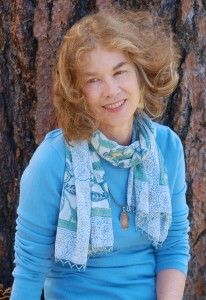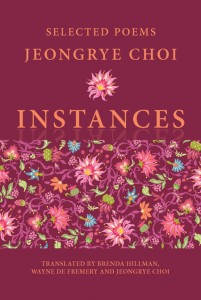
Brenda Hillman has published eight collections of poetry, all from Wesleyan University Press: White Dress (1985), Fortress (1989), Death Tractates (1992), Bright Existence (1993), Loose Sugar(1997), Cascadia (2001), Pieces of Air in the Epic (2005), and Practical Water (2009), for which she won the LA Times Book Award for Poetry, and three chapbooks: Coffee, 3 A.M. (Penumbra Press, 1982); Autumn Sojourn (Em Press, 1995); and The Firecage (a+bend press, 2000). She has edited an edition of Emily Dickinson’s poetry for Shambhala Publications, and, with Patricia Dienstfrey, co-edited The Grand Permisson: New Writings on Poetics and Motherhood (2003). In 2010 she co-translated Jeongrye Choi’s book of poems, Instances, released by Parlor Press. She is the Olivia Filippi Professor of Poetry at Saint Mary’s College in Moraga, California.
***

LR: What attracted you to rendering translations of Jeongrye Choi’s poetry?
BH: I met her at Iowa at the International Writers Workshop, and it proved to be interesting and fruitful to work on her poetry with the other students who had some knowledge of Korean. When I found out she was working in Berkeley the following year, we were able to continue working on her poetry, but I needed help from several other people to complete the project. Wayne de Fremery, a Harvard PhD candidate in Korean Studies who lives in Seoul, had met Jeongrye before and agreed to do the transliterating for me and LTI Korea backed us financially. Poet Gillian Hamel served as an advisor and helped produce the manuscript and Byungwook Ryu designed it. Jon Thompson at Free Verse Editions and Dave Blakesley at Parlor Press were also instrumental to this work.
LR: You’ve done some translations before this book. Was there anything that interested you about Choi’s work in terms of the craft of her poetry specifically?
BH: I was interested mostly in her aesthetic and her commitment to the strangeness of the everyday. She has a perception of reality that’s not just run-of-the-mill surrealism. I know she’s doing a lot of language play in Korean, but because I don’t know the original language, I had to rely on what Wayne would tell me was going on. As far as I can tell, one of the things she does is use a lot of—not exactly punning—but she keeps the possibilities of language open so that things can be read as punning on different situations, and that really interested me. I tried to get that sense when we were rendering it into English. I think the quality of imagination is rendered really well, so the images do carry a lot of linguistic content. And the things that do translate well are the repetition and intimate forms of address that are open to the reader and can also be taken as an address to self. At times, you can’t tell whether she’s addressing herself or the reader, and I found that really appealing as well.
LR: Did you notice any particular differences in the cultural transformation of bringing a contemporary Korean poet to an American audience?
BH: There’s a bringing forth of a feminist, politically motivated and more populist poetry that speaks to everyday experience and that’s also considered more linguistically radical. I think she fits into that too. There’s an effort that might be in keeping with some of what has gone on in American avant-garde poetry, a continuance of the engagements with modernist fragmentary forms, and also with the psychological and with women’s issues.
She’s a very precise writer. I found it really interesting because I had two different experiences with translating in a span of two years. The first was with Poems from Above the Hill: Selected Poems of Asher Etwebi, a collection of work from a Libyan poet that I co-translated with Diallah Haidar. My experience with Jeongrye had to do more with discussions of how literal to be with the Korean because it’s really hard to be literal when the grammatical structures are so different, even in the way the sentence is maintained.
LR: In the introduction, you wrote that in Choi’s poetry “meaning is restless: it goes back and forth,” and Choi herself says that her work deals with “fragments of memories.” As I was reading, I also thought that a lot of her poems pull the reader in and out of time. In one poem she writes “time floats on the muddy water,” which seems to describe the experience for me reading her work. Did time and fragmentation affect your rendering of her poems?
BH: Wayne and I tried to work on the sentence structure, so it’s not as fragmented as someone like Barbara Guest. It is very disjunctive, where you’ll set up one thought paratactially next to a very different one. A better description of what Jeongrye does is that she puts fragmented thought into grammatical context. That’s how it was described to me from the transliterations. They were usually in disjunctive, fragmentary sentences. Jumpy is a good word.
LR: Going back to what you said about Choi having a sort of feminist or politically motivated bent to her work. Also, in the book’s introduction, you wrote that you find her work to be feminist “in an instructive way.” As a poet who also tackles issues of feminism in your own writing, and as an activist, how do you find her work to be instructive?
BH: She’s of a younger generation, and I feel in some way that American feminism has informed a lot of international poetry too. I feel instructed by her—maybe instructed is the wrong word—but a solidarity and sisterly-ness with her sense of quirkish freedom that reminds me of slightly previous feminism from the 1970s. Even though it fits into a sort of grouping, her mind is very playful. She’s wild. She has freedom of emotion, and she expresses a community with other women, like in her poem “Lebanese Emotion,” which is one of my favorites. She says:
Veiled women pass by
against a background of buildings pocketed by bombs exploding.
Hollowed eyes flashing; they come and go like gulls;
Maybe it was me.
She’s really getting at a condition of identification for all people in that poem, and identification with a difficult condition of the world through a more emotional approach—through the image that women are allowed to express more freely in all cultures. That draws me to her feminism.
LR: I know in your own work that you have a spiritual or mystical connection to the natural elements and that a current interest for you is eco-poetics. Does Jeongrye Choi’s work interest you on that spiritual or mystical level too?
BH: Again, that draws me to it because she has a playful connection to the nonhuman. For instance, she writes about crabs with one leg inside the hole. She writes poems to geese, and tigers, and frogs, and watermelons, even the moon gets a lot of attention and shadows. In my own eco-poetics, I’m more interested in naming things. Hers comes from more symbolic representations of trees, and plants, and animals, but they’re all animated in a way that involves an interaction with human imagination. She interacts with shadows that she mistakes for something else, and that makes it special.
Very often, those things are figures for either emotions or relationships. For her, I think relationships are problematic, and so the natural world, or the nonhuman world, is a way of entering into these human relationships with a different kind of symbolic figuration. There’s a poem called “A Forest of Donkey Ears” that I really love, in which the poet thinks she sees donkey ears, but it’s really leaves, and then it turns into memory and becomes a figure for the mistakes we make.
Like understanding the cry of the redpoll
only as the red of berries,
like something heard before
with a knitted brow—
Who was it? What was it?
If you can understand the animal or the nonhuman, then you can somehow get clearer on what’s often difficult for this poet.
LR: Do you think her work has universal appeal?
BH: Like all good poets, she works with local situations that get bigger as they become symbolic as a whole. Again, I think she’s speaking to women’s experiences that become representative of here’s how it is: to have children, to have different love affairs, to have hope in a dangerous situation. She’s on the border of dangerousness a lot, so there’s a sense of the universal. She writes of departure and love affairs that haven’t worked—it’s never quite clear why. I think she gets “universal” mileage of never saying the why but just saying the what.
With the where, I think of a poet like René Char who writes symbolically about living in the French countryside, but the places he talks about could be anywhere as opposed to someone who’s writing very specifically about one place. Then there are writers like Gary Snyder who write about their own locale, and you can extrapolate a lot from that. Jeongrye seems to me an urban, or suburban, poet because she writes about being in cities and seeing the things that are there in the city, or in the house. The editors constructed a statement on the back that says she “creates environments at once familiar but dreamlike,” and I think it’s a very good description actually.
I also like her statements at the end, and I sort of take her saying, “Now that I am alive and have a memory and can feel things deeply, I have to answer the questions of who I am, and where I am. So I write,” back to the question of women’s experience and poetic experience in the world. I like to have themes emerge in the brain. There’s a powerful nature of living in a symbolic world that teaches you more and gives you more material. It enriches reality to live very deeply and strangely and imagistically in the world. I wouldn’t say it’s only particular to her work, but poetry in general. The delicacy and intricacy of her poetics, like many poets who write conversationally offers a deeper, more vital way to live.
Great questions followed by insightful responses that reflect Brenda’s poetic experience and intellect!